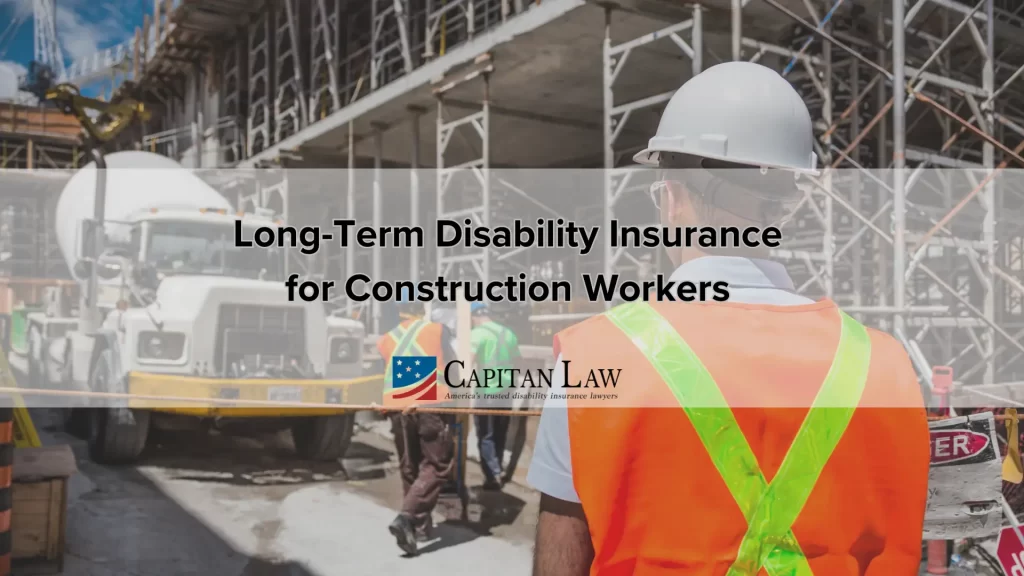
Long-Term Disability Insurance for Construction Workers
A disability that lasts several months or longer can take a big bite out of injured construction workers’ income, creating financial chaos when the injured workers are already dealing with a stressful situation. Long-term disability insurance can provide financial support in these situations, but insurers frequently deny claims and leave injured workers in the lurch. In many cases, the only way to get an insurer to pay up is to take legal action against them.
At Capitan Law, our long-term disability insurance lawyers proudly represent workers across many industries and help them recover the money they need. No matter your occupation, we’re here to guide you through this complex process and make sure the insurance companies honor their policies. Though our offices are in Kentucky and Pennsylvania, we represent clients in both those states, New Jersey, and throughout the country. Call (267) 419-7888 today or fill out our contact form for a consultation.
What Is Long-Term Disability Insurance?
Long-term disability insurance is a financial lifeline when times get tough. It provides a steady income stream to ensure your bills get paid and your family is cared for. While employers are not required to offer long-term disability coverage, many businesses include it in their benefits package, and we urge everyone to take advantage of this benefit if it’s provided. Alternatively, you can purchase an individual policy if your employer doesn’t offer it.
What Benefits Do Long-Term Disability Insurance Policies Include?
It’s crucial to have an attorney review your long-term disability policy after an accident. They can explain exactly what it says and what benefits you can recover. Having said that, most long-term disability insurance policies include the following benefits:
- Income Replacement: The main function of long-term disability insurance is to replace a portion of your lost income. Typically, this ranges from 50 to 60 percent of your salary, though some policies will pay a higher percentage of your pre-disability income.
- Long-term Coverage: Unlike short-term disability insurance, which usually covers only a few months, long-term disability insurance can provide coverage for several years or even until retirement age in certain policies. (Most long-term disability policies don’t kick in until you’ve been out of work for 90 days or longer.) This can be especially valuable in cases of serious illness or injury.
- Rehabilitation Services: Some long-term disability insurance policies may also provide coverage for rehabilitation services. This coverage can include money for physical or occupational therapy to help you regain your abilities and potentially return to work.
- Cost of Living Adjustment (COLA): Some policies include a COLA feature. This means your benefit amount may increase over time to keep pace with inflation, ensuring that your purchasing power remains consistent.
- Waiver of Premium: This is a feature where the insurance company waives your insurance premiums while you’re receiving disability benefits. This can help lessen your financial burden after a severe injury or illness.
- Survivor Benefits: In the unfortunate event of your death, some long-term disability insurance policies provide a lump sum payout to your designated beneficiaries.
 Long-Term Disability Insurance vs. Workers’ Compensation
Long-Term Disability Insurance vs. Workers’ Compensation
Workers’ compensation and long-term disability insurance share some key similarities but also have significant differences. Both forms of coverage aim to replace lost income if you cannot work due to an injury or illness. They may also provide coverage for necessary medical treatments, such as doctor visits, medications, surgeries, and rehabilitation services, ensuring you can focus on your recovery without the added stress of medical bills.
However, there are critical differences in the circumstances under which each type of coverage applies and the benefits provided. Workers’ compensation is specifically for work-related injuries or illnesses, and your benefits last for as long as you cannot return to work. Typically, workers’ compensation provides about two-thirds of your average weekly wage. Importantly, workers’ compensation operates within state laws, meaning systems can vary significantly from one state to another.
In contrast, long-term disability insurance covers you regardless of where or how your injury or illness occurred. It does not matter if the injury is work-related or not. It replaces a specified portion of your salary, usually between 50 and 60 percent, for a defined period – often several years or until retirement age. Long-term disability insurance is generally governed by federal law, particularly when it’s provided as an employee benefit.
Common Issues With Construction Worker Disability Claims
Construction workers frequently encounter bureaucratic or technical issues when filing a claim. Insurance companies make their money by paying as little for claims as they think they can get away with. Here are a few of the most common hurdles injured construction workers encounter with long-term disability claims:
- Insufficient Medical Evidence: Insurance companies often deny claims due to inadequate medical documentation. This can include incomplete medical records or a lack of proper diagnostic tests. A doctor’s opinion that fully details the extent and impact of the disability is necessary.
- Pre-existing Condition Exclusions: Some insurance policies do not cover conditions that existed before the policy was taken out. If the insurer believes the disability is due to a pre-existing condition, they might deny the claim.
- Disagreement on Disability Status: Insurers may dispute whether a worker is “disabled” as defined by the policy. Some policies will only cover injured workers until they can return to any job that suits their education and background. Others provide benefits until the injured worker can return to their specific job. These subtle differences can have an outsized impact on a disability claim.
- Extended Wait Periods: Most long-term disability policies have an “elimination period” or a waiting period before benefits begin. This can be problematic for workers who cannot handle the financial burden during this time.
How Our Disability Lawyers for Construction Workers Can Help
If you cannot work for an extended period due to an injury or illness, the money from a long-term disability claim is crucial to helping you pay your bills and live comfortably while you heal. Our lawyers can help you through this process by:
- Guiding You Through the Claims Process: An attorney can guide you through the complex claims process, help you understand the requirements and deadlines, and ensure that all necessary paperwork is completed correctly.
- Gathering and Reviewing Medical Evidence: Your attorney can assist in gathering all the necessary medical documentation, work with your doctors to ensure your medical records reflect the severity of your condition, and help present this evidence effectively.
- Negotiating Settlements: If a lump-sum settlement is an option, your attorney can negotiate with the insurance company on your behalf to help you receive a fair and adequate settlement.
- Preparing for Trial: In the event your case goes to trial, an attorney can help prepare your case, handle all the legal procedures, and present your claim in a compelling light.
The long-term disability lawyers at Capitan Law know how frustrating these claims can be and want to make this process as simple as possible. Call (267) 419-7888 today or reach out online for a consultation.
Related Posts:
 Long-Term Disability Insurance vs. Workers’ Compensation
Long-Term Disability Insurance vs. Workers’ Compensation